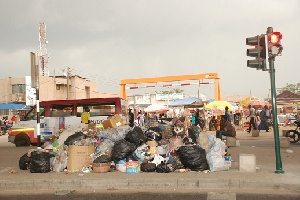 The poor sanitation conditions in Accra makes it difficult to make it the cleanest city in Africa
The poor sanitation conditions in Accra makes it difficult to make it the cleanest city in Africa
The subject matter of this feature is a paraphrase of an original 1967 book by African American Baptist minister, social justice campaigner, Nobel Peace Prize laureate, and one of the greatest organic intellectuals in American and world history – the Rev. Dr Martin Luther King, Jr.
The title of the book is; Where Do We Go from Here: Chaos or Community? In writing this book, Dr King spent a long period in isolation, living in a rented residence in Jamaica with no telephone.
The book which advocated for human rights and a sense of hope was Dr King's fourth and last book before his assassination. One of the central themes of the book’s messages is that of hope, the audacity of it.
Dr King reflects upon the Civil Rights Movement. He discusses the question of what African Americans should do with their new freedoms found in laws such as the Voting Rights Act of 1965.
He concludes that all Americans must unite in order to fight poverty and create an equality of opportunity.
In a similar fashion and in a symbolic shadow of thought processes, I want this feature – “Where Do We Go From Here: Filthiness or Cleanliness,” to serve as Accra and a people’s right to choice with associated consequences, and to choose cleanliness over filthiness, good over evil, right over wrong, positivity over negativity.
Just as Dr King and the modern American civil rights movement, when faced with a choice between violence and nonviolence, chaos and community – they chose nonviolence over violence and ultimately community over chaos, Accra must do same; choose cleanliness over filth.
On this endeavour, there is the need to transform the attitudes of our people – residents and visitors alike, with regards to sanitation, can certainly not be overemphasized. We have to really make a bold and enduring choice between Filthiness and Cleanliness in our nation’s capital, Accra.
Accra in this sense stands as a symbolic representation for all other Ghanaian cities and towns; from 2018 and even beyond when proposals are being discussed to facilitate twinning city arrangements between Accra – the capital city of Ghana (where Dr King visited in 1957; and was greatly inspired to continue the black equality rights struggle), and Atlanta – the capital city of the State of Georgia - USA; which served as the institutional capital for the civil rights movement and where Dr King was born.
I trust 2018 is truly a momentous year. It is the 50th anniversary of one of the most tragic, catalytic and meaningful events in American and world history – the death of US civil rights activist Dr Martin Luther King Jr. A man who has been celebrated worldwide for his role in helping America end racial discrimination and served as well, as an inspiration for oppressed people everywhere to assert, strive and stride towards freedom and justice.
It was in Accra that, Dr King remarked to Vice President Richard Nixon that, Ghana's independence signifies in its true essence the desires and aspirations of black people everywhere for freedom and justice, and solemnly requested same for the African American people of the United States, as the civil rights movement was at its zenith in those times.
Furthermore, Accra is the symbol of the independence struggle of Africa and its people; and consistent with its position as a pioneer, remains today one of the biggest stars of the new African Hope after it led the way in bequeathing to a continent and its people and diaspora an audacity of hope.
Additionally, Accra is the home of the Diasporan African Forum, the first Diasporan Mission anywhere in Africa at the William Edward Burghardt (WEB) Dubois Center with the objective of encouraging Diasporan participation in the development of Africa, coupled with its symbolism as an umbrella organization for all Pan-African organizations the world over.
It is in this light that, Accra, a city which was established in 1898 and would be celebrating 120 years of cityhood has since the assumption of Akufo-Addo’s government launched a bold and ambitious project to make Accra, the cleanest city in Africa; as finishing touches are afoot to officially unveil a modern City Hall in the coming months, for a city on the go.
To this vein, a young and dynamic Chief Executive Officer – Mohammed Nii Adjei Sowah, was appointed to take charge as the Mayor of the City of Accra. He is together with his dedicated team, to drive the President’s vision and mission, as well as his to make Accra the great city it was and must be, as captured in this catchy slogan hashtag #AccraLiveInLoveIt.
In an era characterized by keen global and national interest in Water, Sanitation and Hygiene (WASH) issues, the Akufo-Addo government thought it wise to create another Ghanaian first, the Ministry of Sanitation and
Water Resources to help Accra in its quest to provide 21st-century winning solutions to choose cleanliness over filthiness.
Let Accra keep the engaging synthesis with her people - residents and visitors alike; thought leaders and other public intellectuals in a sustained manner going forward.
Revelations from the recent Graphic Engages Experts on Sanitation forum and the IMANI Africa event at the British Council Hall in Accra to show Ghana's sanitation has failed. Why should it be so? And how Do We Get It Right?